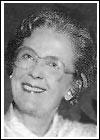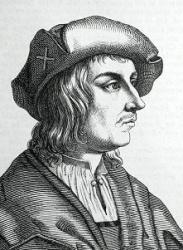Planning worship?
Check out our sister site, ZeteoSearch.org,
for 20+ additional resources related to your search.
- |
User Links
Person Results
‹ Return to hymnal


Export as CSV
Melody Poitiers
Hymnal Number: 249 Composer of "ROUEN" in Singing the New Testament There is probably not a person named "Melody Poitiers". The tune ROUEN comes from Poitiers Antiphoner, 1746.
Melody Poitiers
Isobel Beaston
Person Name: Isobel H. Beaston Hymnal Number: 223 Versifier of "Surrounded By So Great a Cloud of Witnesses" in Singing the New Testament Isobel H. Beaston graduated from Ursinus College in Pennsylvania in 1954. She is a poet and has won several awards. She lives in Media, Pennsylvania.
Dianne Shapiro
Isobel Beaston
Gertrude C. Suppe
1911 - 2007 Hymnal Number: 92 Translator of "Mantos y Palmas (Filled with Excitement)" in Singing the New Testament Gertrude Suppe (b. 1911) is well known not only for her translations, but also for her pioneer work in compiling all known Hispanic church music in a database that has been an invaluable resource.
Sing! A New Creation!
Gertrude C. Suppe
June Fischer Armstrong
Hymnal Number: 29 Composer of "[I Am the Light of the World]" in Singing the New Testament
June Fischer Armstrong
Bayiga Bayiga
Hymnal Number: 57 Author of "Where Two or Three" in Singing the New Testament
Bayiga Bayiga
Stanley L. Osborne
1907 - 2000 Hymnal Number: 152 Adapter and Harmonizer of "ARFON" in Singing the New Testament Stanley Llewellen Osborne, studied music at the University Toronto, and later, theology at Emmanuel College, and was ordained a United Church Minister in 1932. Dr. Osborne was co-editor of the United Church's Canadian Youth Hymnal (1939), and full-time secretary to the joint committee of the United Church and the Anglican Church of Canada for The Hymn Book, which they published together in 1971. In 1975 he completed If Such Holy Song, the story of the hymns in the Hymn Book 1971.
--SICM (Summer Institute of Church Music, 03 July 2014.
Stanley L. Osborne
AnnaMae Meyer Bush
b. 1947 Hymnal Number: 139 Author of "If We Confess" in Singing the New Testament
AnnaMae Meyer Bush
Mark Barnard
b. 1959 Hymnal Number: 22 Author of "Ask, Seek, and Knock" in Singing the New Testament
Mark Barnard
Mary Jackson Cathey

b. 1926 Hymnal Number: 118 Adapter of "God's Holy Spirit Came" in Singing the New Testament Mary Jackson Cathey (b. 1926) was born in Florence, SC, and educated at Winthrop University, Rock Hill, SC. She received an advanced degree from Union Seminary - Presbyterian School of Christian Education in Richmond. As a Christian Educator she finds hymn text writing a profound way to express her faith. Her hymns have won contests sponsored by The Hymn Society in the United States and Canada, and a number of her poems have been published by John Knox Press, The Pilgrim Press, and Hope Publishing. She has four hymns to her credit in The Presbyterian Hymnal (1990) and others published by Selah Press, Choristers Guild, and Zimbel Press. She is an elder at the National Presbyterian Church in Washington, DC.
--www.hopepublishing.com
==========================
Mary Jackson Cathey is the Director of Religious Education at the Bethesda Presbyterian Church, Bethesda, Maryland. She formerly served in a similar capacity in the First Presbyterian Church, Anderson, South Carolina. She obtained her M.R.E. degree from the Assembly's Training School, Richmond, Virginia, in 1953; and her A.B. from Winthrop College, Rock Hill, South Carolina, in 1947. She was married recently to Mr. Henry M. Cathey of Bethesda. She is the author of one of the 1956 Youth Hymns entitled "Come forth, O Christian Youth."
--Twelve New World Order Hymns, 1958. Used by permission.
Mary Jackson Cathey
Lazarus Spengler

1479 - 1534 Person Name: L. Spengeler Hymnal Number: 133 Author of "Creation Fell in Adam's Fall" in Singing the New Testament Spengler, Lazarus, was the 9th of the 21 children of Georg Spengler and Agnes his wife, and was born March 13,1479, at Nürnberg, where his father was clerk of the Imperial court of Justice (Landgerichtschreiber). He entered the University of Leipzig in 1494; but on the death of his father on Dec. 27, 1496, he returned to Nürnberg, obtained a position in the town clerk's office, in 1507 became himself town clerk (Raths Syndikus), and in 1516 also Rathsherr. When Luther was passing through Nürnberg, in 1518, on his way to Augsburg, Spengler made his acquaintance. He warmly espoused the Reformation doctrines, published in 1519 his Schutzre in Luther's favour, and himself became one of the leaders in the Reformation work at Nürnberg. He was one of those condemned by name in the Bull of Excommunication launched by Pope Leo the Tenth, on June 15, 1520, against Luther and his friends. Dr. Eck sent the Bull to the Town Council of Nürnberg, and urged them to proceed against Spengler, but they ignored it, and then sent him as one of their representatives to the Diet of Worms, in April 1521. In 1525 Spengler went to Wittenberg to consult with Luther and Melanchthon as to turning the Benedictine Aegidienstift (Schottenkloster) into an Evangelical Gymnasium, and this was opened as such by Melanchthon on May 23, 1526. Spengler was also the prime mover to the Visitation of 1528, and upheld strict Lutheranism in the negotiations at the Diet of Augsburg in 1530. He died at Nürnberg, Sept. 7, 1534 (Koch, i, 308 ; Will's Nürnbergisches Gelehrten-Lexikon, iii., p. 731; Herzog's Real-Encyklopädie, xiv., 516).
Spengler was a trusty friend and valued counsellor of Luther and the principal Reformers of Germany. He also interested himself in the improvement of the church services, and in 1532 was able to have an authorised Liturgy (Kirchenordnung) printed. He wrote a considerable quantity of verse, sacred and secular ; but only two hymns are ascribed to him.
The one is an indifferent version of Ps. cxxvii., beginning "Vergebens ist all Müh und Kost." The other is:—
Durch Adams Fall ist ganz verderbt. Fall and Redemption. First published in the Geystliche Gesangk Buchleyn, Wittenberg, 1524, and thence in Wackernagel, iii. p. 48, in 9 stanzas of 10 lines…During the Reformation period it attained a wide popularity as a didactic and confessional hymn of the Evangelical faith. It is one of the most characteristic hymns of the time, conceived in the spirit of deep and earnest piety, eminently Scriptural, and setting forth the Reformation teachings in concise and antithetical form, but is however too much like a system of theology in rhyme.
The translations are:—- 1. "By Adam's fall was so forlorne." By Bishop Coverdale, 1539, reprinted in his Remains, 1846, p. 556. 2. "When Adam fell our total Frame." By J. C. Jacobi in his Psalmodia Germanica, pt. ii., 1725, p. 17. [Rev. James Mearns, M.A.]
--Excerpts from John Julian, Dictionary of Hymnology (1907)
Lazarus Spengler


 My Starred Hymns
My Starred Hymns


